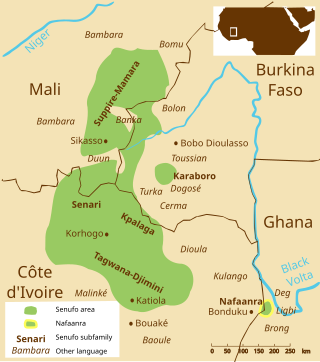| Nafaanra | |
|---|---|
| Native to | Ghana, Ivory Coast |
| Region | North-west corner of the Brong-Ahafo Region in Ghana, east of Bondoukou in Ivory Coast |
| Ethnicity | Nafana |
Native speakers | 61,000 in Ghana (2003)[1] |
Niger–Congo?
| |
| Language codes | |
| ISO 639-3 | nfr |
| Glottolog | nafa1258 |
 Nafaanra, some neighbouring languages, and other Senufo languages. | |
Nafaanra (sometimes written Nafaara, pronounced [nafãːra]) is a Senufo language spoken in northwest Ghana, along the border with Ivory Coast, east of Bondoukou. It is spoken by approximately 61,000 people.[2] Its speakers call themselves Nafana; others call them Banda or Mfantera. Like other Senufo languages, Nafaanra is a tonal language. It is somewhat of an outlier in the Senufo language group, with the geographically closest relatives, the Southern Senufo Tagwana–Djimini languages, approximately 200 kilometres (120 mi) to the west, on the other side of Comoé National Park.
The basic word order is subject–object–verb, similar to Latin and Japanese. Like other Niger–Congo languages it has a noun class system where nouns are classified according to five different genders, which also affects pronouns, adjectives and copulas. The phonology features a distinction between the length of vowels and whether they are oral or nasal (as in French or Portuguese). There are also three distinct tones, a feature shared with the other Senufo languages. Nafaanra grammar features both tense and aspect which are marked with particles. Numbers are mainly formed by adding cardinal numbers to the number 5 and by multiplying the numbers 10, 20 and 100.
- ^ Nafaanra at Ethnologue (18th ed., 2015) (subscription required)
- ^ Ghana Institute for Linguistics, Literacy, and Bible Translation (GILLBT) 2003, as cited in Gordon, Raymond G., Jr. (ed.), 2005. Nafaanra: a language of Ghana. Ethnologue: Languages of the World, Fifteenth edition. Dallas, Tex.: SIL International. Retrieved on 2007-04-10